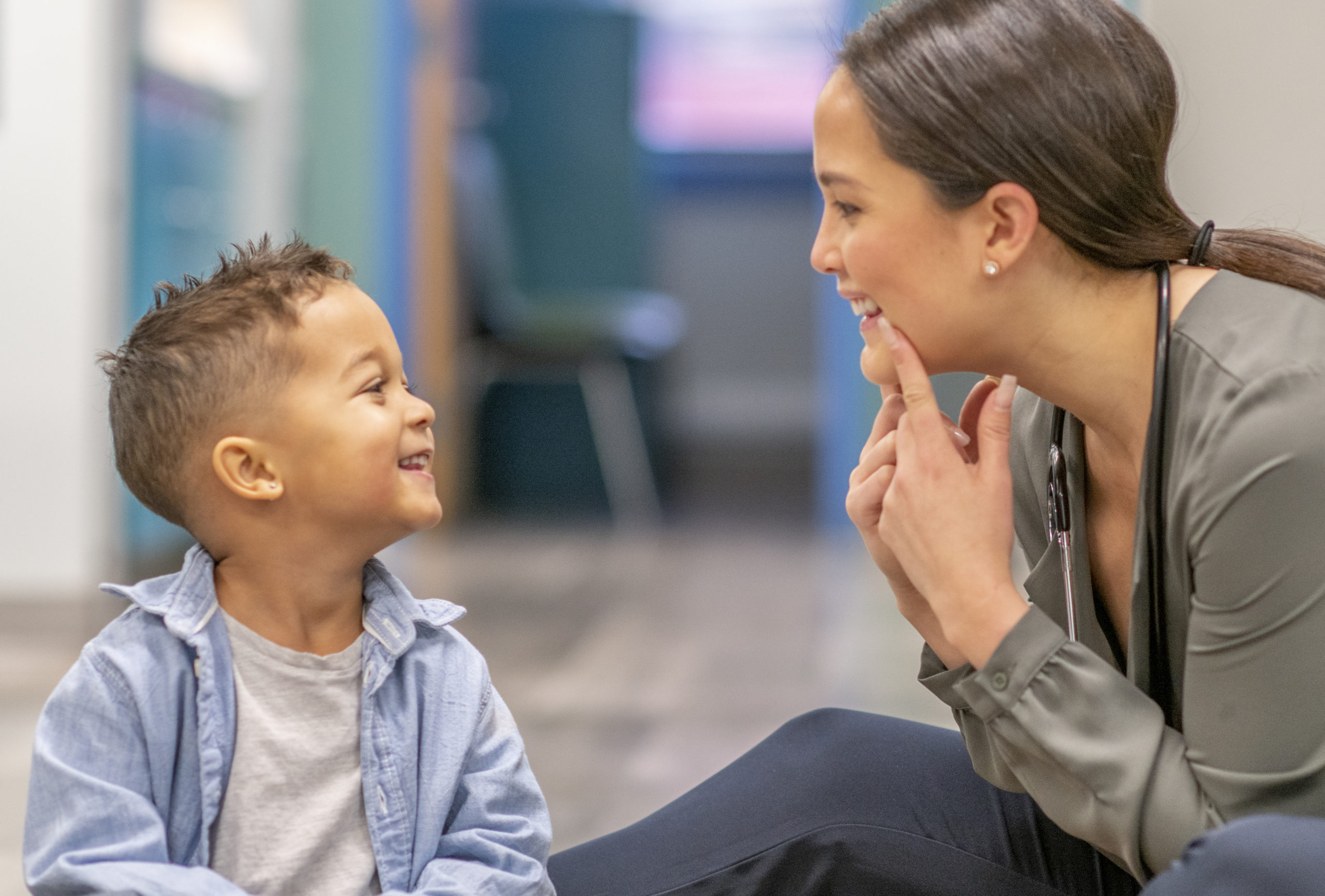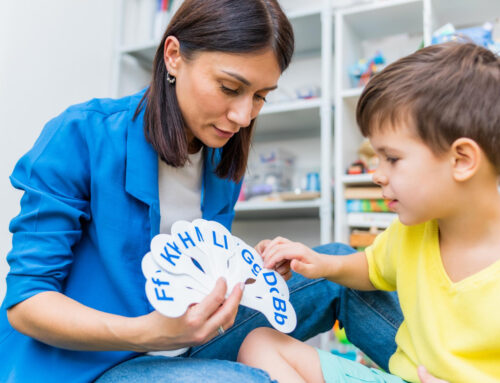The two primary types of language dysfunctions are receptive language disorder and expressive language disorder. Language disorders occur when a person has difficulty comprehending others’ spoken or written language (receptive language), or sharing ideas, thoughts, and feelings orally or in writing (expressive language). Language disorders may take place in both spoken and written communication and may involve the content (semantics), form (syntax, phonology, morphology), and/or use (pragmatics) of language in socially appropriate and functional aspects.
Receptive Language Disorder
Receptive language refers to how a child understands language. A receptive language disorder is a type of communication disorder. It has no single cause and can be related to autism, birth defects, or problems with pregnancy or birth.
Young children with receptive language disorder may experience problems interacting with other children and difficulty understanding what others say. Behaviors that are also noticeable in children with this disorder include poor eye contact, tuning out when people talk, and asking people to repeat what they said. These children may have difficulties following directions that contain basic concepts as related to facets of daily living (i.e. big, little), and may respond in ways that don’t make sense. Receptive language disorder can be a lifelong condition. It is not a matter of intelligence but those having it may be unable to fully express their intelligence.
Pre-school children with language difficulties may experience difficulties understanding age-appropriate vocabulary words, interacting with peers, and understanding new and novel sentences. These children also encounter problems understanding stories at four years of age or following one-step directions.
Still more language difficulties for those suffering from receptive language disorder are problems understanding correct grammar and comprehending grammatically correct sentences/phrases/words in the proper order for sentences and questions. In addition, they experience obstacles understanding “wh” questions (who, where, when), completing academic tasks such as organizing verbal information, understanding stories, and memorizing facts, plus following two-step and complex directions.
Expressive Language Disorder
Expressive language skills involve the ability to use words, sentences, and gestures to convey meaning to others. An expressive language disorder is a lifelong condition that affects the ability to use language. People with this condition usually understand what others are saying but have difficulty expressing their own ideas when they speak. However, there are people who have this disorder who may also have receptive language disorder.
Expressive language includes being able to name actions, label objects, and describe events. Children with expressive language disorder run into problems constructing words to make sentences, using correct grammar, and answering questions. They have difficulties retelling a story and writing a short story. What makes expressive language important is that it enables children to express their needs, desires, and thoughts, state an opinion, develop use of language in writing, and verbally interact with others.
Different aspects needed to develop expressive language include pre-language skills including facial expressions, gestures, eye contact, imitation, and mutual attention, play skills that may or may not be goal-oriented, and pragmatic use of language in social situations. Additional aspects needed to develop expressive language include motivation to communicate with others, fine motor skills such as signing (if verbal language is not developing), comprehension of language, and sustained attention and concentration.
There are other indicators that a child is having difficulties with expressive language. For example, the child might speak in phrases that are shorter than those of their peers, or might use immature or muddled sentences. This would include sentences in which the different parts of speech are used incorrectly. Unfortunately, a child with this disorder may avoid talking altogether because of their frustration. This can create difficulties for both the child and the listeners, as they may not understand the origin of the problem.
Children having difficulty with expressive language may display:
- problems with behavior–usually due to frustration with not being understood,
- difficulty with language comprehension,
- little to no participation in class discussions,
- problems with social skills – including reciprocal interactions, compromising, and following social norms,
- delayed basic reading and writing literacy,
- difficulty writing in a logical sequence,
- an inability to speak fluently,
- an inability to verbally sequence a multi-step task,
- decreased higher-order thinking skills, and/or
- inaccurate interpretation of sensory stimulation.
Possible causes of expressive language disorder include genetics, autism, problems with pregnancy or birth, and brain injury or illness.
Ways to Improve Expressive Language Disorder
Fortunately, there are different methods used to improve a child’s expressive language. One of these is having the child play with toys and other children, and then express what they are doing with the toys (e.g. “I am pouring water in a cup. You are cutting the red paper. I need the glue.”). Another is talking with the child continually about what you are doing, where you are going, what you have just done and what you are going to do (e.g. We finished buying vegetables at the store. Now we are going to the library.).
Other effective methods include getting face-to-face with the child so they can see you produce words, gradually expanding the child’s language by adding a word or two to what they said (e.g. if the child points and says “juice”, you say “Oh, you want more juice?” to provide a longer language model, and looking at books together to talk about the text and the pictures. It also improves a child’s expressive language if you repeat back to the child what they said incorrectly and say it in the correct way (e.g. If the child says “I eated crackers”, you say “Good job….you ate all your crackers.”).
Supplemental activities that could also aid improvement are playing something the child likes and during the activity, add in new words and phrases. Looking at books together and talking to them about what is happening in a story is also another approach. Other beneficial methods to improve a child’s expressive language include singing songs together, using drawings to make a sequence of events and then make up a story about the drawings, reading stories to model proper use of language, writing letters, and talking together about a picture.
Therapeutic Intervention for Expressive Language Disorder
What therapeutic intervention can do for a child experiencing difficulties with expressive language includes improving the child’s ability to express needs, wants, ideas, and thoughts; developing an ability to relate events to others, telling a story, and participating in discussions; and improving the child’s ability to respond appropriately to questions.
Therapeutic intervention also assists in expanding the length of what the child is saying; developing the child’s vocabulary; aiding expressive language development by improving pre-language and play skills; assisting the child in reducing frustration if they are not being understood by repeating back to the child what can be understood (i.e. the child gains confidence in expressing himself/herself when some of the message has been accurately repeated by the listener); and developing other modes of communication if verbal language is not developing properly (i.e. sign, gesture, eye contact, Picture Exchange Communication System – PECS).
If difficulties in expressive language are not treated, the child may also experience difficulties with engaging in social interactions and forming friendships, developing reading and writing skills, completing academic tasks and higher-level critical thinking skills, and applying for jobs in both written applications and interviews.
If the child is having difficulty with language, one should consult a speech therapist. If there are other problem areas, an occupational therapist may be necessary. The sooner a disorder can be diagnosed, the sooner the child can receive assistance with building language skills.
Diagnosis for Receptive or Expressive Language Disorder
To obtain a diagnosis, you need to be evaluated by a speech-language pathologist. These specialists may work in schools, clinics, hospitals, or private practice. Receptive and/or expressive language disorders can be diagnosed at any age, but the sooner it’s identified, the better.
As to when is a speech-language evaluation recommended, the following guidelines apply:
- Does not use single words by 15 months
- Does not use 50 words or 2-word phrases by 24 months
- Does not follow 2-step directions by 24 months
- Is not understood 90% of the time by 4-year olds
- Difficulty interacting with peers
- Difficulty with problem-solving skills or memory
- Demonstrates tense stutter-like difficulties like repeating parts of words/single sounds in words (m-m-m-m-mine), experiencing cessation of speech (want………..up), or prolonging some sounds in words (juuuuuuuuuuuuump)
- Has a rough or strained voice or sounds nasally
What to Expect During a Language Evaluation?
During an hour-long language evaluation, the speech-language pathologist will obtain information about the child’s developmental milestones, medical history, and other parental concerns. Depending on the child’s communication skills and age, the speech-language pathologist may also converse with the child and collect language samples or observe spontaneous utterances while the child is playing. The pathologist may also ask the child to follow directions while increasing complexity, to name age-appropriate vocabulary words, and to answer questions about stories they read or were read to. The pathologist will also administer standard language testing which includes identifying and naming items, answering questions, describing pictures, and following directions.
What to Bring to a Language Evaluation?
Those accompanying the child to a language evaluation should bring a Speech-language intake packet, copies of previous evaluations, including the IEP/IFSP if your child is receiving services through the Birth to Three program or school, and results from a recent hearing test (if available).
What to Expect During Language Therapy?
Based on the results of the child’s language evaluation, language therapy may be recommended. During treatment, the speech-language pathologist may engage with the child on answering questions, following directions, understanding conversations and stories, understanding and behaving appropriately to social situations, and working on grammatical elements such as correct verb tenses, pronouns, and plurals.
With a diagnosis for receptive and/or expressive language disorder, it is important to delineate the following speech and language development milestone categories–milestones are delineated in the links:
- Birth to 12 months: https://www.childrensmn.org/references/pfs/rehabpublic/speech-and-language-development-birth-to-12-months.pdf
- 12 to 18 months: https://www.childrensmn.org/references/pfs/rehabpublic/speech-and-language-development-12-to-18-months.pdf
- 18 to 24 months: https://www.childrensmn.org/references/pfs/rehabpublic/speech-and-language-development-18-to-24-months.pdf
- 24 to 30 months: https://www.childrensmn.org/references/pfs/rehabpublic/speech-and-language-development-24-to-30-months.pdf
- 30 to 36 months: https://www.childrensmn.org/references/pfs/rehabpublic/speech-and-language-development-30-to-36-months.pdf
- Hearing and speech development: https://www.childrensmn.org/references/pfs/rehabpublic/speech-and-language-development-30-to-36-months.pdf
- Playing with sounds: https://www.childrensmn.org/references/pfs/rehabpublic/playing-with-sounds.pdf
- Sign language for hearing children: https://www.childrensmn.org/references/pfs/rehabpublic/sign-language-for-hearing-children.pdf
American Speech-Language Hearing Association (ASHA)
- Birth to Five Years: https://www.asha.org/public/speech/development/chart/
- Kindergarten Through Fifth Grade: https://www.asha.org/public/speech/development/communicationdevelopment/
Summary
Language disorders occur when a person has trouble understanding others’ spoken or written language (receptive language), or sharing their own thoughts, ideas, and feelings either orally or in writing (expressive language).
People with receptive language may also have trouble organizing their thoughts. It is important to receive therapy for receptive language disorder because those with it struggle to understand words and connect them with ideas. That can make it hard to connect with people, whether it’s at school, at work, or in the community. Receptive language disorder can cause people to withdraw socially.
People with expressive language disorder understand what others are saying, unless they have a dual receptive/expressive diagnosis. But they have a hard time expressing their own ideas when they speak. It is important to receive therapy for expressive language disorder because persons experiencing it often struggle to form sentences that make sense. They may need extra time to take a turn in a conversation or answer questions. These challenges can make it difficult to connect with people, form relationships, and make friends.
To learn more about language evaluations and language therapy, get in touch with our pediatric services team.
Top 20 Frequently Asked Questions
1. What Causes Receptive Language Disorders?
Receptive language disorders can have a variety of causes, including hearing problems, delays in cognitive development, or exposure to an environment with limited language opportunities. It is essential to identify the cause of the disorder to ensure proper treatment & intervention.
2. Can Receptive Language Disorder Be Fixed?
Receptive language disorder can be improved with the help of intensive therapy, but it cannot be fixed. The goal of therapy is to improve a person’s ability to understand language & use it effectively in communication.
3. Is Receptive Language Disorder A Learning Disability?
Receptive language disorder is not considered a learning disability. Still, it can significantly impact a person’s ability to learn & interact with others.
4. What Are The Symptoms Of Receptive-expressive Language Disorder?
Common symptoms of receptive-expressive language disorder include difficulty understanding & following directions, difficulty communicating effectively with others, problems with word recognition & recall & difficulty with reading comprehension.
5. How Can You Tell That A Child Has A Problem With Receptive Language?
A child may have a problem with receptive language if they cannot understand spoken or written words, have difficulty following directions, or have difficulty understanding & using language in conversations.
6. Is Receptive Language Disorder Part Of ADHD?
Receptive language disorder is not a symptom of ADHD but can be seen in children with ADHD. It is essential to get an accurate diagnosis to ensure that the child receives appropriate treatment & intervention.
7. What Age Is Receptive Language Disorder?
Receptive language disorder can occur in people of any age but is most commonly diagnosed between ages 3 & 8.
8. Is Receptive Language Delay Autism?
Receptive language delay is not a symptom of autism but can be seen in children with autism. It is crucial to get an accurate diagnosis to ensure that the child receives appropriate treatment & intervention.
9. Is Receptive Language Disorder Genetic?
Receptive language disorder is not thought to be caused by a single gene. However, there may be a genetic component involved. Research suggests that some cases of a receptive language disorder may be inherited. It is vital to get an accurate diagnosis to ensure that the child receives appropriate treatment & intervention.
10. Can A Child With A Receptive Language Delay Catch Up?
Yes, with the help of intensive therapy & intervention, a child with a receptive language delay can improve their understanding & use of language. It is essential to get an accurate diagnosis & identify the cause of the delay to ensure that the child receives appropriate treatment & intervention.
11. What Are Examples Of Expressive Language Disorders?
Examples of expressive language disorders include difficulty forming sentences, using words & understanding nonverbal communication cues. Other symptoms may include difficulty expressing thoughts & feelings, difficulty with grammar & syntax & difficulty understanding abstract concepts.
12. Is Expressive Language Disorder Autism?
Expressive language disorder is not a symptom of autism but can be seen in children with autism. It is essential to get an accurate diagnosis to ensure that the child receives appropriate treatment & intervention.
13. Can Expressive Language Disorder Be Corrected?
With the help of intensive therapy, expressive language disorder can be improved. While it cannot be “fixed,” a child can learn to better understand & use language to communicate effectively.
14. What Is Expressive Language Disorder & What Causes It?
Expressive language disorder is a communication disorder that affects the ability to express oneself verbally & in writing. It can be caused by various factors, including a delay in developing language skills, hearing loss, neurological problems, intellectual disabilities, or cognitive impairments.
15. How Do You Treat Expressive Disorder?
Expressive language disorder treatment typically involves speech and/or behavioral therapy. Speech therapy focuses on increasing language understanding by teaching the child to recognize letters, words & sentences. Behavioral therapy focuses on increasing the child’s communication skills by providing strategies for better articulation & expression.
Additionally, certain medications can help treat expressive language disorder.
It is essential to get an accurate diagnosis & identify the cause of the delay to ensure that the child receives appropriate treatment & intervention. With the correct diagnosis, therapy & support, a child with an expressive language disorder can make great strides in their communication skills.
16. Who Treats An Expressive Language Disorder?
Speech-language pathologists are typically the ones who diagnose & treat expressive language disorders. Speech-language pathologists have specialized training in speech, language & communication disorders. They are best suited to treat the disorder by developing individualized therapy plans that help a child develop more vital language skills.
17. Is Expressive Language Disorder A Mental Disorder?
No, an expressive language disorder is not considered a mental disorder. It is a communication disorder that affects the ability to express oneself verbally & in writing.
18. Is Expressive Language Disorder A Disability?
It depends on the severity of the disorder. Some forms of an expressive language disorder may be considered a disability if they significantly interfere with daily activities or functioning.
19. Is Expressive Language Disorder Common?
Expressive language disorder is not uncommon, but it is not as common as other communication disorders, such as receptive language disorder.
20. How Can I Help My Child With Expressive Language Disorder?
If your child has been diagnosed with expressive language disorder, there are several ways you can help.
- First, creating a supportive learning environment & providing structure to help your child develop their language skills is essential.
- You can also work with a speech-language pathologist to find activities to help your child practice their language skills.
- Finally, be patient & encourage your child to express themselves as much as possible.
With the correct diagnosis, therapy & support, a child with an expressive language disorder can make great strides in their communication skills.










